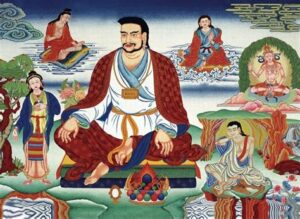I’ve been to China a couple of times. I worked there for part of a year as a teacher. It was in ChangSha, in the center of the country, Hunan province. I worked with college level students and had lots of free time in which to explore the area. In December it got pretty darn cold there.
ChangSha was just getting “westernized” when I was there, but now I heard they’re planning to make the tallest building in the world there. Shows you how fast things have changed in China.
In China, there are several sacred mountains which have been home to some amazing acolytes, monks, temples, and various types of hermits. I hope to look at these mountains in depth. I will 1st mention Huashan which has a reputation as the holiest of the amazing Daoist mountain retreats. (In Chinese SHAN means mountain.)
Huashan is just east of Xian on the road to Luoyang, where the legendary Lao-Tze worked awhile. To the southwest toward Chengdu is a famous mountain Emeishan, which is the spiritual nexus of the Buddhist culture of China. There are officially 5 “special mountains” in China, but many others are illustrious also.

” 1- Mount Tai is famous for its majestic character, 2- Mount Hua is famous for its precipitous nature, 3- Hengshan Mountain is famous for its peacefulness, 4- Mount Song is famous for its steepness and 5- Mount Heng is famous for its elegance. Each of the Five Sacred Mountains has its own characteristics and they are all famous worldwide.”
SongShan is also known as the home of the Shaolin Temple.
The Wandering Taoist is a novel about a wandering warrior monk who is trained at Huashan.
 ” … over the centuries the Buddhists began to regard four peaks as having primary sanctity:
” … over the centuries the Buddhists began to regard four peaks as having primary sanctity:
- Pu Tuo Shan, Buddhist mountain of the east, Zhejiang province, 284 meters. Sacred to Kuan-Yin, the Bodhisattva of Compassion.
- Wu Tai Shan, Buddhist mountain of the north, Shanxi province, 3061 meters. Sacred to Manjushri, the Bodhisattva of Wisdom.
- Emei Shan, Buddhist mountain of the west, Sichuan province, 3099 meters. Sacred to Samantabhadra, the Bodhisattva of Benevolent Action.
- Jiu Hua Shan, Buddhist mountain of the south, Anhui province, 1341 meters. Sacred to Kshitigarbha, the Bodhisattva of Salvation.
Each of the Buddhist sacred mountains is considered to be the dwelling place of a Bodhisattva.”
robaireg@yandex.com
